Can Cats Eat Cheesecake? A Complete Guide
As loving cat owners, we all cat’s owners want to provide healthy and beneficial foods to our cats but when we think “Can Cats Eat Cheesecake?“.
Then we often overthink about our cat’s health and ask “Is cheesecake safe for cats?” If you are one of them, do not worry.
In this complete guide, we will deeply discuss cats and cheesecake, as well as, we will discuss the health impacts(Risks and Benefits) of cheesecake on cats. So let’s get started together.
Cheesecake Is Made Of
Cheesecake is a delicious sweet treat that started in ancient Greece. It’s got a special mix of sweet and tangy tastes, made mainly from cheese (often cream cheese), eggs, and sugar. These ingredients make the filling, which is put on top of a base usually made from crushed biscuits or graham crackers mixed with melted butter.
There are many ways to make cheesecake, and some people might add different kinds of cheese, or extra things like fruits, chocolate, or even spices. It’s important to remember that while these ingredients are safe and tasty for humans, they might not be good for our pet cats.
Can Cats Eat Cheesecake?
The simple and short answer is no. The main parts of cheesecake, like sugar and dairy, aren’t good for cats. Cats eat meat and their bodies can’t handle too much sugar, which could make them overweight and sick. Plus, a lot of cats can’t digest dairy products like cheese and eating it could upset their stomachs, leading to issues like throwing up or diarrhoea.
The base of the cheesecake, usually made from biscuits or graham crackers, also has sugars and other things that aren’t good for cats. So, even though you might love cheesecake, it’s better to keep it away from your cats for their health.
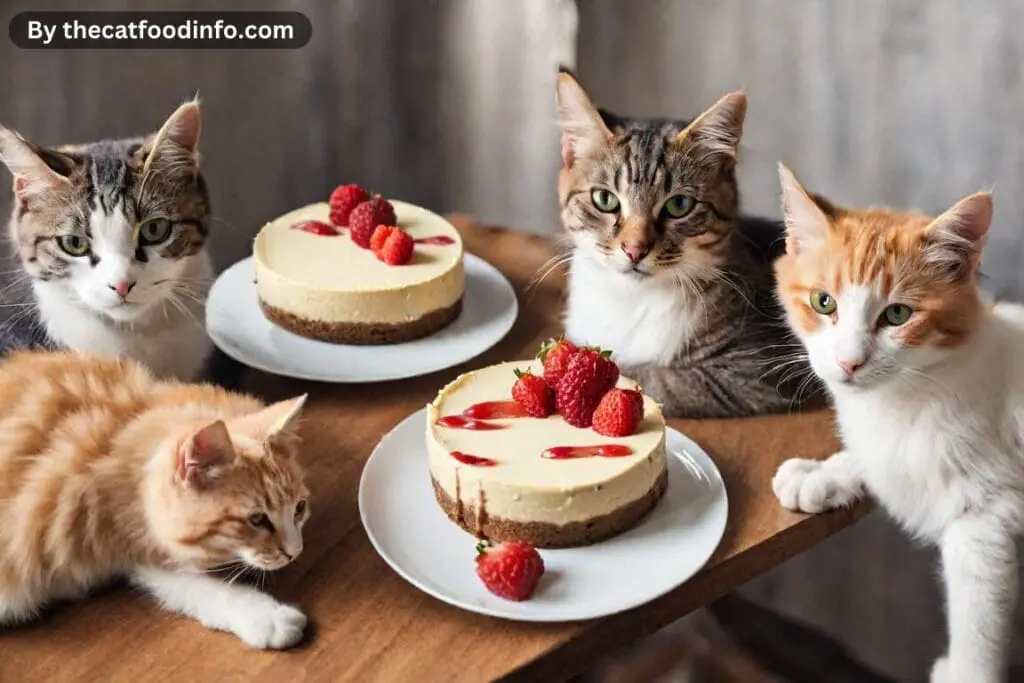
Potential Health Risks Of Cheesecake To Cats
Must keep these risks in mind before feeding cheesecake to cats.
Obesity and Diabetes
Cheesecake has a lot of sugar, which can cause cats to put on too much weight. If cats eat sweet foods like this too often, they could get diabetes. This illness needs to be treated for the rest of their lives and can make cats live for less time.
Digestive Issues
Many cats struggle to break down dairy products like the cheese in cheesecake. This can lead to stomach upset, diarrhoea, and vomiting, resulting in discomfort and possibly causing them to lose too much water.
Tooth Decay
The high sugar content in cheesecake can lead to tooth decay in cats. Unlike humans, cats cannot brush their teeth daily, and tooth decay can lead to further complications such as gum disease and other oral health issues.
Risk of Toxic Ingredients
Depending on the flavour, cheesecakes can contain ingredients that are toxic to cats such as chocolate or certain fruits. Even in small amounts, these can have serious health implications, including toxicity and allergic reactions.
Malnutrition
Cheesecake does not provide the essential nutrients that cats need for a balanced diet. Feeding your cat cheesecake can lead to a deficiency in nutrients, resulting in poor health and potentially leading to conditions associated with malnutrition.
Choking Hazard
Cheesecake might look soft and safe, but it can still be a choking hazard for cats, especially those who eat too fast or don’t chew their food properly. This risk becomes even greater if the cheesecake has big bits of fruit or crust that the cat might choke on.
Risk of Pancreatitis
Cheesecakes often have a lot of fat, especially if they’re made with heavy cheese. Cats, especially those who often have pancreatitis, could get a bad episode of this illness if they eat food with too much fat. Pancreatitis in cats is very serious and can be deadly. It can make cats not want to eat, feel very weak or tired, not have enough water in their bodies, or get a high temperature.
Allergic Reactions
While not common, some cats may have allergies to ingredients commonly found in cheesecake, such as eggs or certain types of cheese. Feeding cheesecake to a cat with these allergies could trigger reactions ranging from mild (itching, digestive upset) to severe (difficulty breathing, collapse).
Dairy Intolerance
Although cats often love dairy products, their bodies aren’t designed to digest lactose effectively, especially as they grow older. Consuming cheesecake can lead to lactose intolerance symptoms such as bloating, gas, diarrhoea, and general discomfort.
Behavioural Issues
Regularly giving your cat human foods like cheesecake can cause problems with their behaviour. Your cat might start to turn down their usual cat food, begin to beg for food when you’re eating, or even try to take food, which can disrupt a calm home environment.
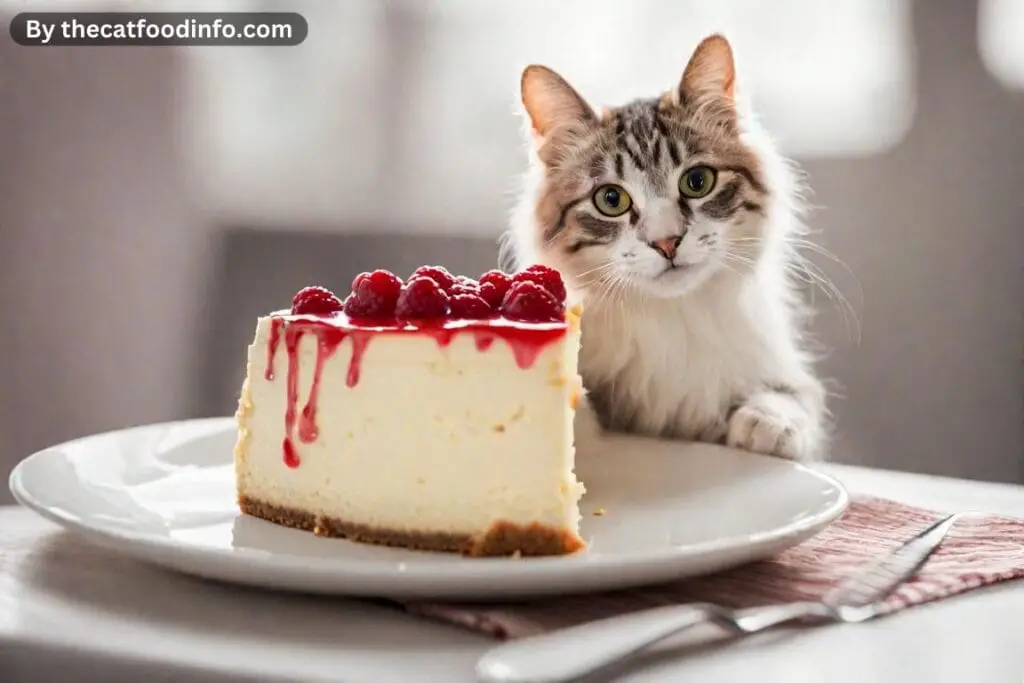
Can Cheesecake Provide Any Benefit To Cats?
While it’s clear that cheesecake is a delightful treat for humans, it’s not suitable for our feline friends. Nevertheless, it’s logical to wonder if there could be any benefits for cats from eating cheesecake.
The straight answer is no. Cheesecake, unfortunately, provides no nutritional benefits for cats. Their dietary needs are unique and require a balance of specific nutrients that can’t be met by human food. Cats are primarily carnivores and require a diet high in animal-based protein. Cheesecake, while high in calories and fats, does not provide the high-quality protein cats need.
Moreover, any tiny amount of nutrients that might be present in a cheesecake (such as calcium in the cheese or carbohydrates in the biscuit base) would be far outweighed by the potentially harmful effects of the other ingredients. This makes it an unsuitable food choice for our kitty companions.
Ultimately, the best way to ensure your cat is healthy and thriving is to feed them a balanced diet specifically formulated for cats, supplemented with occasional cat-approved treats. Always consult with a vet or a pet nutritionist for professional advice on your cat’s diet.
How To Stop Cats From Eating Cheesecake?
Follow these steps to stop your cats from eating cheesecake.
Step 1: Establish Boundaries
The first thing you need to do is make sure your cat knows which places in your home they are not allowed to go into – this is especially important for the kitchen and where you eat your meals. By doing this, you’re keeping your cat safe from things that could hurt them in these areas and keeping them away from human food, including cheesecake.
Step 2: Regular Feeding Schedule
Stick to a regular meal timetable for your cat. By making sure your cat has enough to eat and feels full, you lower the chances of them hunting for more food. It’s crucial to give your cat a balanced diet that fits what they need nutritionally, so they won’t want to eat people’s food.
Step 3: Train with Positive Reinforcement
You can teach your cat to stay away from certain foods by using positive reinforcement. This means, that instead of telling them off when they try to eat people’s food, you reward them when they avoid it. This reward could be a treat they like or some extra playtime.
Step 4: Cat-Proof Your Home
To stop your cat from getting to your cheesecake, you need to cat-proof your home. Ensure that all food is kept in places your cat can’t reach or in containers they can’t open. It’s also a good idea to keep your rubbish bin secured so your cat can’t rummage through it.
Step 5: Provide Cat-Friendly Treats
If your cat is particularly persistent in trying to get to your cheesecake, consider providing cat-friendly alternatives. There are plenty of cat treats available that are safe, tasty, and nutritionally balanced.
Step 6: Consult with a Vet
If your cat continuously tries to eat human food despite your best efforts, you might want to consult with a vet. They can offer advice tailored to your cat’s specific needs and could even provide helpful strategies to discourage this behaviour.
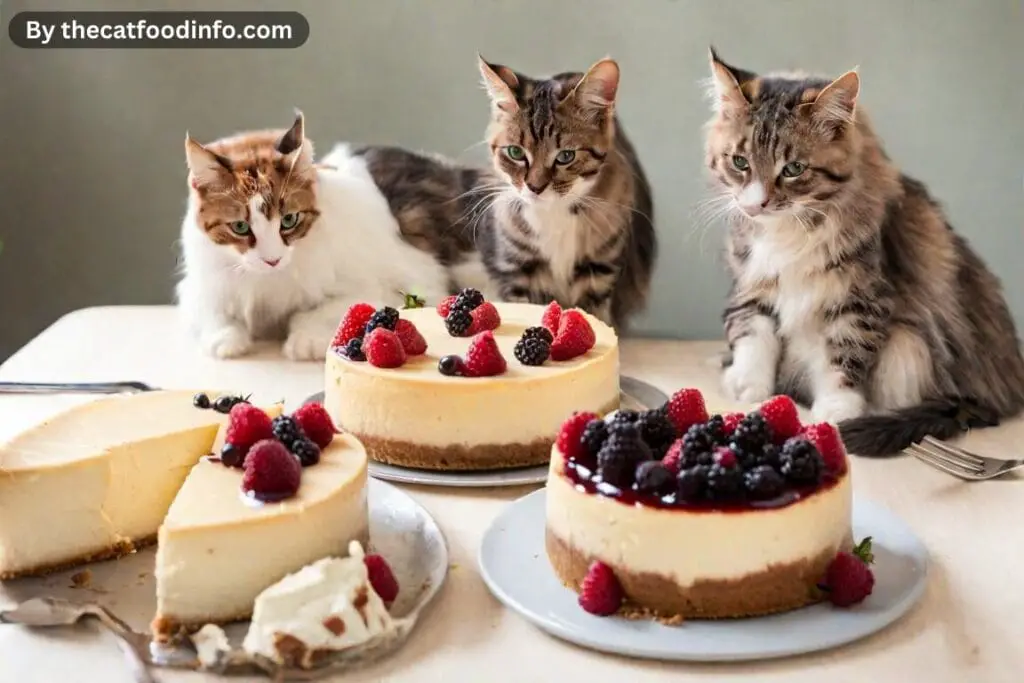
Can We Make Cheesecake Cats-friendly?
Can we modify a cheesecake recipe to make it cat-friendly? The answer is no. Cats need specific foods that are different from human foods. Even if we take out the harmful parts like sugar, some ingredients in cheesecake, like cheese, aren’t good for cats. The best thing to do is give your cat treats made just for them. These treats are safe, yummy, and have all the nutrients a cat needs. If you’re not sure what to feed your cat, always ask your vet for advice.
Can Cats Eat Cheesecake In Small Amounts?
The simple answer is no, cats should not eat cheesecake, even in small amounts. Cheesecake has things in it that are bad for cats, like sugar and fat. If a cat eats cheesecake, even a little bit, it could make them ill. It could upset their tummy, give them a bad allergic reaction or cause a severe illness called pancreatitis.
It’s best to keep cheesecake and other human foods away from cats. Give them cat food and special cat treats instead. If your cat keeps trying to eat human food, it’s a good idea to talk to a vet about it.
What Should I Do If My Cat Eat Cheesecake?
If your cat has had some cheesecake, don’t worry right away. First, check if they’re behaving as usual. If they are, just watch them closely for any unusual behaviour. If they start to act differently or seem sick, get in touch with the vet immediately.
The vet will guide you on what to do. Always remember, it’s better to be safe than sorry. So, if you feel concerned at all, it’s wise to contact your vet.
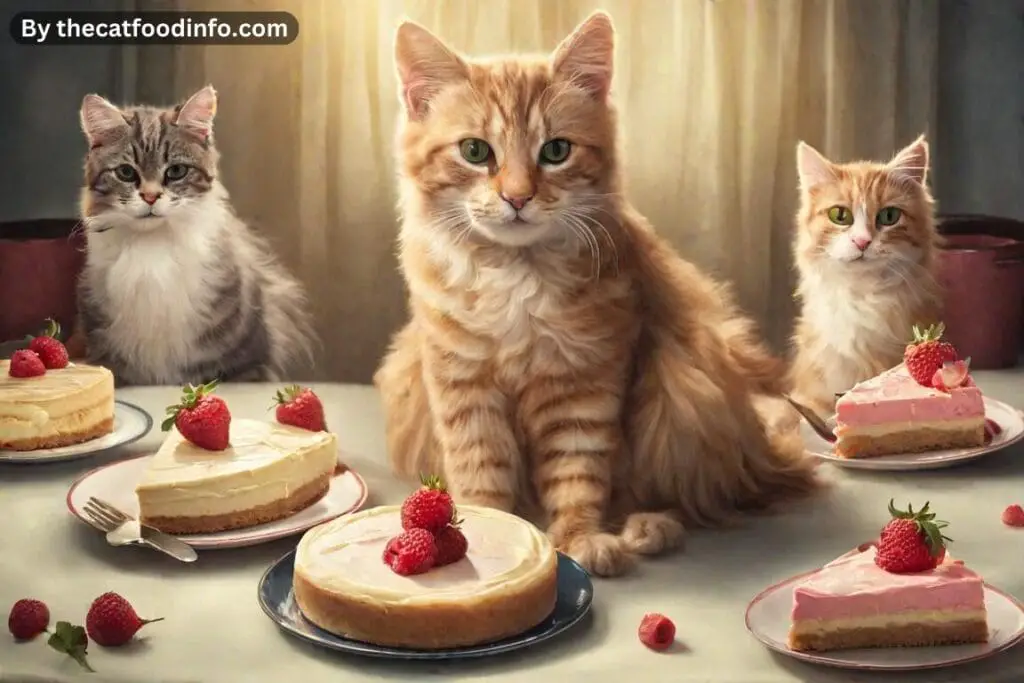
Conclusion
In simple terms, while we may love cheesecake, it’s not good or safe for cats. Cats need different nutrients than us, and eating people’s food, especially sweets like cheesecake, can cause them health and behaviour problems.
To stop your cat from eating human food, you should set rules, feed them regularly, train them using rewards, and give them treats made just for cats. If your cat keeps trying to eat people’s food, get help from a vet. It’s important to remember that we need to take care of our cats’ health and make sure they eat what they should be eating.
FAQs
Can I Give A Smallest Piece Of Cheesecake?
No, it’s not recommended to give cheesecake, even in tiny amounts, to cats.
Can Cats Eat Cheesecake With Proper Physical Exercise?
No, cats should not eat cheesecake, regardless of physical exercise.
What Things Are Toxic In Cheesecake For Cats?
The primary toxic ingredients in cheesecake for cats are sugar, chocolate, and certain artificial sweeteners like xylitol.
Is Cheesecake Toxic For All Animals?
No, cheesecake is not toxic for all animals, but it is generally unhealthy for most pets due to its sugar and fat content.
What Other Animals Can Eat Cheesecake Except Cats?
Not many. Cheesecake is generally not recommended for animals due to its high sugar and fat content.
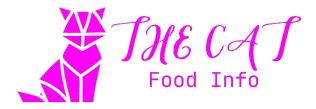
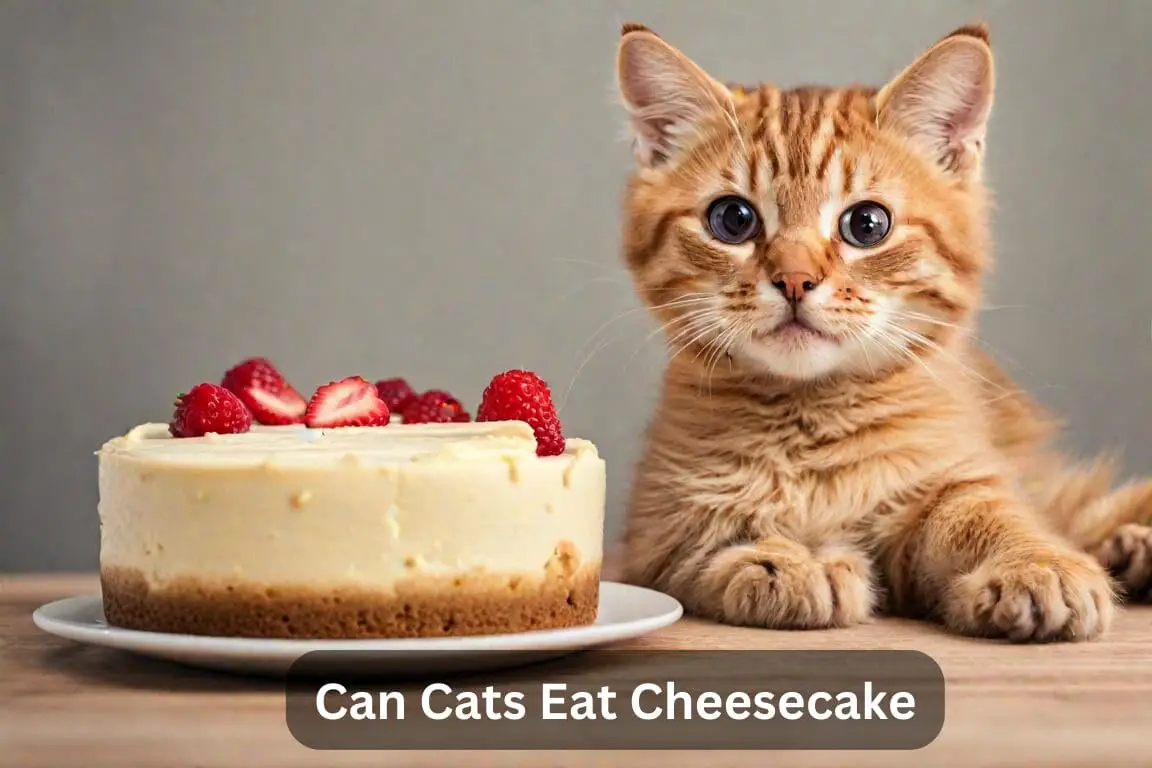
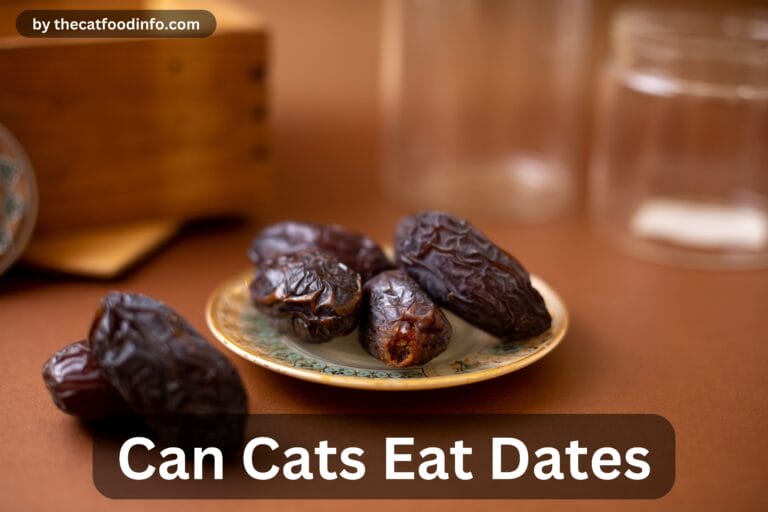
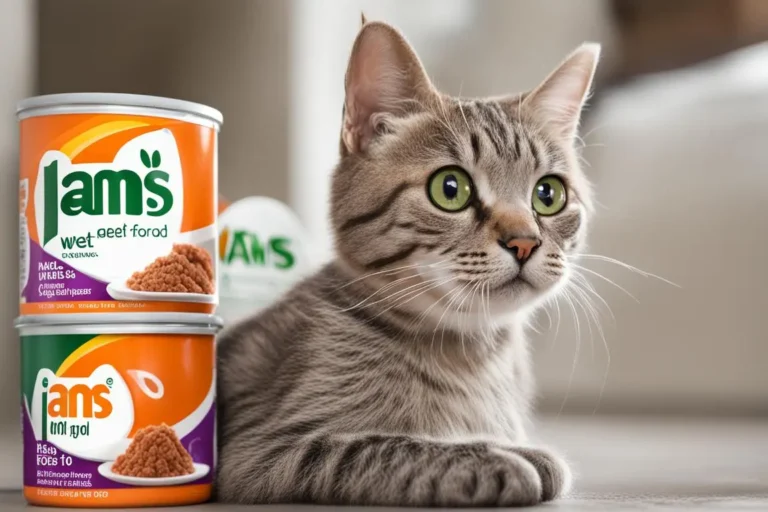
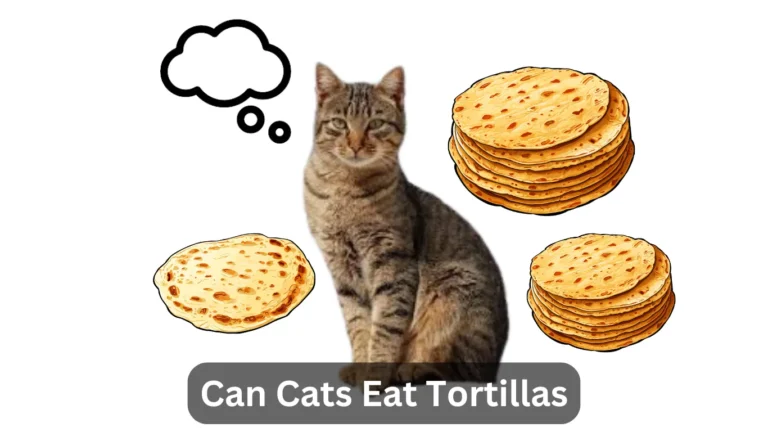
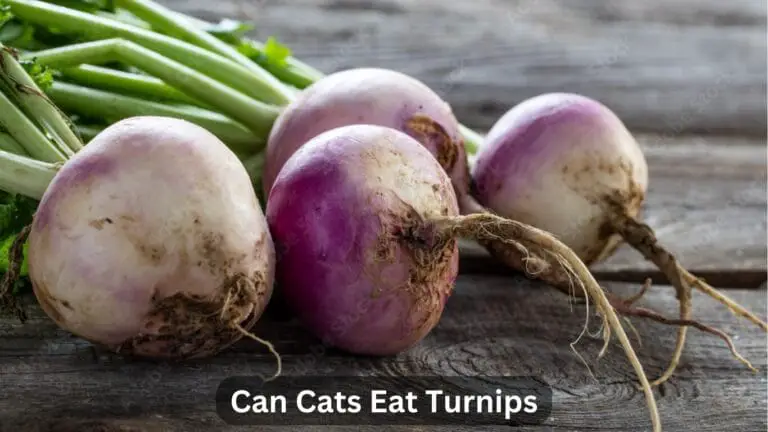
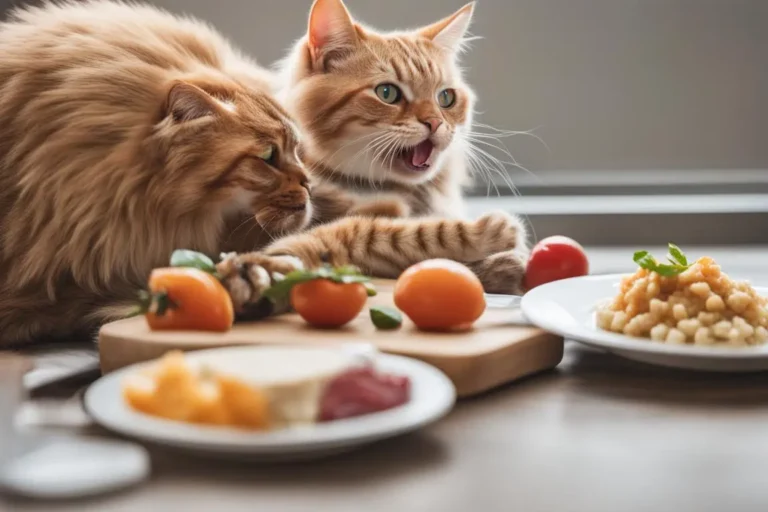
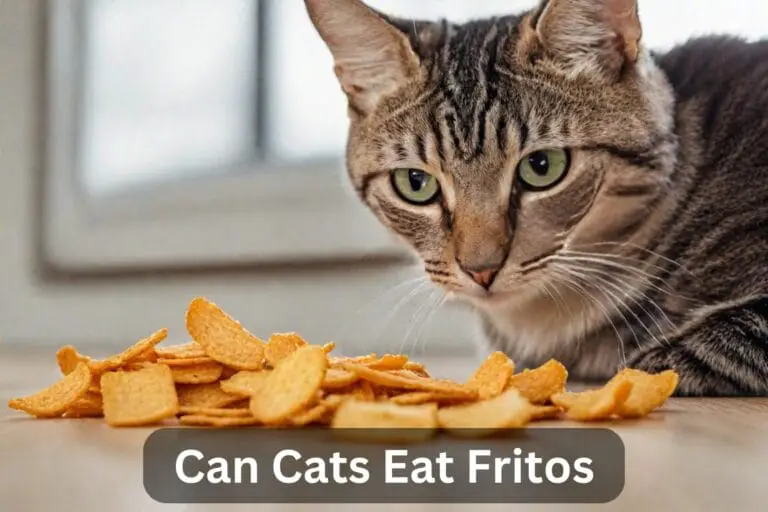
7 Comments